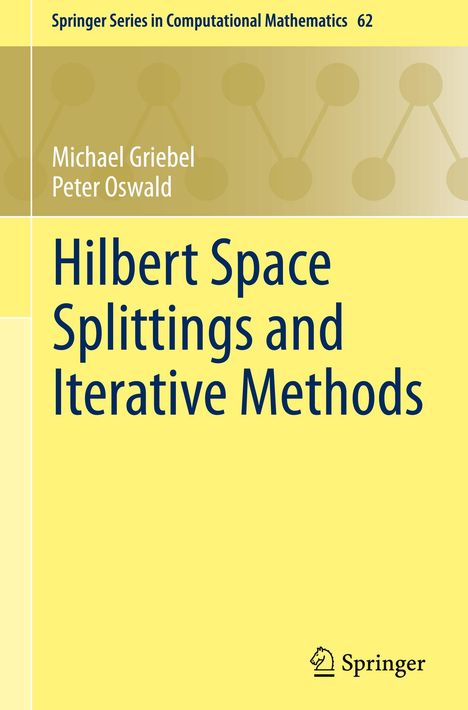Michael Griebel: Hilbert Space Splittings and Iterative Methods, Gebunden
Hilbert Space Splittings and Iterative Methods
(soweit verfügbar beim Lieferanten)
- Verlag:
- Springer, 11/2024
- Einband:
- Gebunden, HC runder Rücken kaschiert
- Sprache:
- Englisch
- ISBN-13:
- 9783031743696
- Artikelnummer:
- 12086528
- Umfang:
- 460 Seiten
- Gewicht:
- 840 g
- Maße:
- 241 x 160 mm
- Stärke:
- 30 mm
- Erscheinungstermin:
- 7.11.2024
- Hinweis
-
Achtung: Artikel ist nicht in deutscher Sprache!
Klappentext
This book is about the theory of so-called Schwarz methods for solving variational problems in a Hilbert space V arising from linear equations and their associated quadratic minimization problems. Schwarz methods are based on the construction of a sequence of approximate solutions by solving auxiliary variational problems on a set of (smaller, finite-dimensional) Hilbert spaces $V_i$ in a certain order, combining them, and using the combined approximations in an iterative procedure. The spaces $V_i$ form a so-called space splitting for V, they need not necessarily be subspaces of V, and their number can be finite or infinite.
The convergence behavior of Schwarz methods is influenced by certain properties of the space splittings they are based on. These properties are identified, and a detailed treatment of traditional deterministic and more recent greedy and stochastic orderings in the subproblem solution process is given, together with an investigation of accelerated methods. To illustrate the abstract theory, the numerical linear algebra analogs of the iterative methods covered in the book are discussed. Its standard application to the convergence theory of multilevel and domain decomposition methods for solving PDE problems is explained, and links to optimization theory and online learning algorithms are given.
Providing an introduction and overview of iterative methods which are based on problem decompositions and suitable for parallel and distributed computing, the book could serve as the basis for a one- or two-semester course for M. S. and Ph. D. students specializing in numerical analysis and scientific computing. It will also appeal to a wide range of researchers interested in scientific computing in the broadest sense.
Biografie (Michael Griebel)
Dr. Michael Griebel ist Ordinarius für Wissenschaftliches Rechnen am Institut für Angewandte Mathematik der Universität in Bonn.
